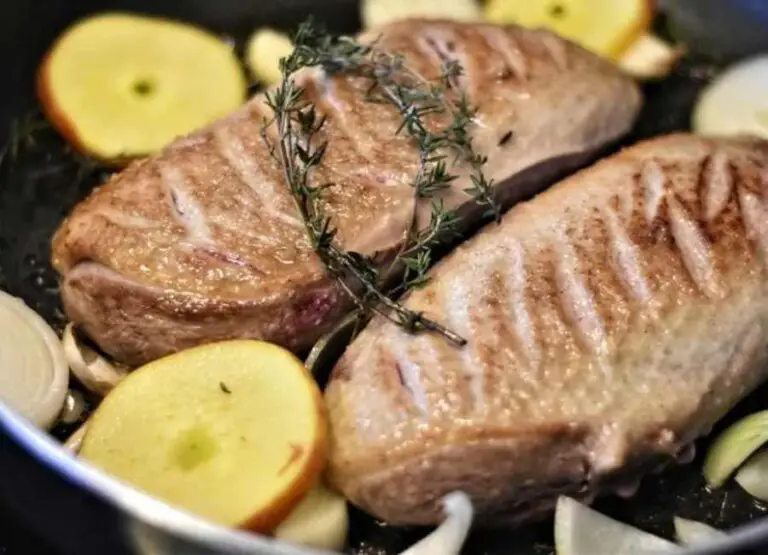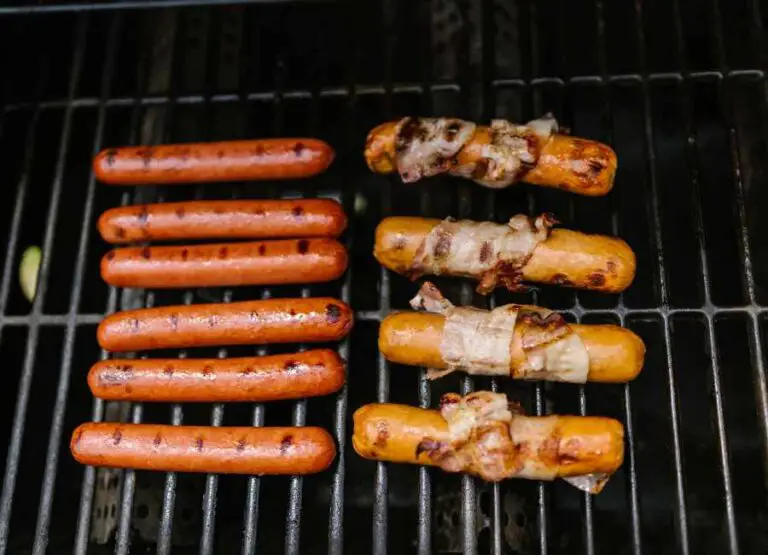Bad Smelling Gas After Eating Meat [Explained]
We will examine the various reasons for foul-smelling gas after eating meat in this blog article.
We’ll talk about how nutrition, food intolerance, and other variables might cause the emission of odoriferous gases, as well as potential remedies and lifestyle modifications that can help lessen offensive odors.
Not only that, but we’ll also talk about the possible health effects of this illness and the value of getting medical help when necessary.
Furthermore, we’ll end by offering some advice on how to avoid having foul-smelling gas after eating meat.
Bad smelling gas after eating meat
The production of smelly gas after eating meat is a normal digestive process.
This can occur due to the breakdown of proteins in meat by bacteria in the large intestine, which produces sulfurous gases such as hydrogen sulfide.
To reduce the odor, you can try limiting the amount of meat in your diet, staying hydrated, and consuming more fiber-rich foods.
If the odor is persistent or accompanied by other symptoms, it’s best to speak to a doctor.
Why does meat cause bad-smelling gas?
Due to the presence of some amino acids that include sulfur, meat might result in foul-smelling flatulence.
These amino acids can release sulfurous fumes with a powerful, disagreeable odor when they are broken down in the digestive system.
Anyone who consumes meat may experience this natural physiological process.
Reasons for foul-smelling gas after eating meat
Foul-smelling gas after eating meat can be caused by a variety of factors.
Intolerance to certain components of meat, such as lactose or gluten, can lead to the release of bad-smelling gas.
Additionally, meat can contain high amounts of sulfur-containing compounds, proteins, and fats, all of which can be difficult to digest and lead to the release of foul-smelling gases.
Finally, some meats are higher in purines, which can be broken down into foul-smelling gases such as hydrogen sulfide.
Other possible causes of foul-smelling gas after eating meat include food poisoning, an overgrowth of bacteria in the small intestine, or a digestive disorder such as irritable bowel syndrome or celiac disease.
How meat is digested in the body
Meat digestion in the body occurs in several stages, including the following:
- Mouth: Meat is broken down into tiny bits as it is chewed, increasing the surface area on which digestive enzymes may function. The amylase enzyme, which is found in saliva produced in the mouth, starts to break down the meat’s carbohydrate content.
- Stomach: When the chewed meat enters the stomach, it is combined with digestive enzymes and stomach acid. The meat’s proteins are divided into smaller peptides by the acid and enzymes.
- Small intestine: In the small intestine, where digestive enzymes produced by the pancreas and small intestine are released, the partially digested meat is further broken down. These enzymes, which disassemble peptides into their component amino acids, include trypsin, chymotrypsin, and peptidases.
- Large gut: In the large intestine, where bacteria ferment the residual food particles and undigested meat, gas is produced as a result.
Overall, the digestive system is capable of efficiently dissecting meat into its constituent pieces, enabling the body to absorb vital minerals like protein, iron, and zinc.
How gas is formed in the digestive system
When bacteria in the large intestine break down undigested food, gas is produced in the digestive tract.
Fermentation is the process that results in the emission of gases such as carbon dioxide, methane, and hydrogen.
Additionally, gas buildup in the digestive tract can be facilitated by swallowing air while eating and drinking.
Factors that can increase gas production in the digestive system
The following are some common factors that can increase gas production in the digestive system:
- High-fiber diets: Foods high in fiber, such as beans, lentils, and whole grains, can cause the digestive tract to produce more gas.
- Lactose intolerance: People who are lactose intolerant may produce more gas after consuming dairy products.
- Artificial sweeteners: Since sorbitol and mannitol are poorly absorbed in the digestive system, they may cause more gas than necessary.
- Swallowing air: Eat or drink too quickly, chew gum, or wear dentures that don’t fit properly to avoid swallowing too much air, which can increase gas production.
- Certain foods: Foods that are known to stimulate gas production in the digestive tract include broccoli, cabbage, onions, and carbonated beverages.
- Gastrointestinal disorders: Irritable bowel syndrome (IBS) and inflammatory bowel disease (IBD) are two gastrointestinal conditions that can cause the digestive tract to produce more gas.
The normal amount of gas produced by the body
Although each person’s body generates different amounts of gas normally, on average it is thought that each individual produces between 1 and 3 pints of gas every day.
This covers both the gas generated by bacterial fermentation in the large intestine and the gas that is ingested.
While some of this gas may also be passed by burping, the majority of it leaves the body through flatulence (passing gas). Up to 20 times a day of gas passing is regarded as normal.
Read more about red meat and constipation.
Role of bacteria in gas production
By utilizing a process known as fermentation to break down organic waste, bacteria play a critical part in the generation of gas. Gases like carbon dioxide and methane are produced as a result.
Bacteria are utilized in sectors including waste management and agriculture to ferment organic waste into biogas, a mixture of methane and carbon dioxide that may be used as a sustainable energy source.
The fermentation of undigested carbohydrates by gut bacteria also contributes to gas generation, resulting in the emission of gases including hydrogen, carbon dioxide, and methane.
Symptoms of bad-smelling gas after eating meat
The digestion of meat can occasionally result in foul-smelling gas. These signs might be:
- Foul odor: Gas generated after eating beef may have an overpowering, unpleasant stench.
- Bloating: Bloating is a sensation of fullness in the belly and can result from eating a lot of meat.
- Flatulence: Flatulence, or the expulsion of gas from the rectum, can occur as a result of excessive gas production after consuming meat.
- Abdominal pain or discomfort: Some persons may develop stomach pain or discomfort as a result of the gas generation following meat consumption.
The majority of the time, these symptoms are unharmful and go away on their own within a few hours to a few days.
To rule out any underlying medical or digestive disorders, it is advised to see a doctor if the symptoms worsen or continue.
Read more about smoked meat and indigestion.
How to Reduce Bad-Smelling Gas After Eating Meat
The following are some ways to reduce bad-smelling gas after eating meat:
- Increase fiber intake: Increasing your intake of fiber can help control digestion and lessen flatulence. Fiber-rich meals include fruits, vegetables, and whole grains.
- Avoid high-fat meats: Avoid high-fat meats since they might cause more gas to produce, which is unpleasant. Try to choose leaner meat cuts and consume fewer servings.
- Drink water: Drink plenty of water to assist your body to eliminate toxins and prevent gas from building up in your digestive tract.
- Chew meat properly: Chew food thoroughly before swallowing it to aid in digestion and lessen the amount of gas that is produced in the digestive system.
- Avoid foods that are known to cause gas in the digestive system: foods including beans, lentils, cabbage, onions, and carbonated beverages are known to cause gas in the digestive system. These foods might be restricted or avoided to lessen flatulence.
- Try over-the-counter remedies: By dissolving intestinal gas bubbles, products like simethicone can help relieve bloating and flatulence.
- Exercise regularly: Regular physical exercise can help remove trapped gas and stimulate the digestive system.
It’s critical to keep in mind that everyone has a unique digestive system, meaning that some things may induce flatulence in one person but not another. It is recommended to consult a medical professional if your symptoms persist.
Furthermore, it’s critical to keep in mind that everyone has a unique digestive system, meaning that some things may induce flatulence in one person but not another.
It is recommended to consult a medical professional if your symptoms persist.
Learn more about eating undercooked beef.
When to Seek Medical Attention
If you have foul-smelling gas after eating meat and any of the following symptoms, you should visit a doctor:
- Cramps or soreness in the abdomen.
- Both constipation and diarrhea.
- Distension or discomfort.
- Nausea or vomiting.
- Either a loss of appetite or weight.
- Stool with blood in it.
These signs may point to a digestive problem, such as food poisoning, IBS, or an infection. It is advisable to speak with a healthcare provider for an accurate assessment and treatment if you have any worries or are exhibiting any symptoms.
Frequently Asked Questions
What can I do to lessen the smell of my flatulence after consuming meat?
Try eating smaller quantities, avoiding high-fat meats, and increasing your fiber intake to assist move food through your digestive system more rapidly to lessen the smell of gas after eating meat.
Does consuming meat with a high-fat content promote the production of offensive gas?
Yes, high-fat foods take longer to digest and may result in more offensive gas being produced.
Is it okay to consume meat if it gives out offensive gas?
Yes, it is normally okay to consume meat that generates unpleasant gas. To rule out any underlying digestive concerns, it’s a good idea to chat with a doctor if you encounter persistent or severe symptoms.
Why does eating meat make my gas smell bad?
When the sulfur-containing amino acids in various types of meat, particularly red meat, are broken down in the digestive system, the result might be the release of foul-smelling sulfur fumes.
Is this a typical occurrence?
Yes, many people report passing gas that has a distinct odor after eating meat.
Could this be a symptom of a digestive issue?
After eating meat, some people may have an increase in gas that may be related to a digestive disorder like lactose intolerance, irritable bowel syndrome (IBS), or other food sensitivities.
Conclusion
In conclusion, there are a variety of reasons why you could get unpleasant gas after eating meat.
While it’s critical to take action to lessen gas odor, it’s equally crucial to consider other potential underlying reasons.
To rule out any potential health concerns and to make sure you are eating a good, balanced diet, it is important to speak with a doctor if the stench doesn’t go away.
You may lessen the stench of your gas and enhance your digestive health by making the appropriate dietary and lifestyle modifications.
Further reading…


![Do Smoked Meats Need To Be Refrigerated [Answered]](https://foodcreeks.com/wp-content/uploads/2023/03/Do-Smoked-Meats-Need-To-Be-Refrigerated-768x555.jpg)
![Is Deer Meat Bad For You [Answered]](https://foodcreeks.com/wp-content/uploads/2023/02/Is-Deer-Meat-Bad-For-You-768x555.jpg)
![Is Pork Sausage Healthy [Full Explanation]](https://foodcreeks.com/wp-content/uploads/2023/02/Is-Pork-Sausage-Healthy-768x555.jpg)



